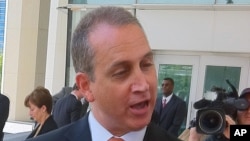House Republicans unveiled legislation Tuesday to sharply curb the Obama administration's recent moves to ease U.S. restrictions on travel to Cuba.
The provision by Rep. Mario Diaz-Balart, a Cuban-American from Florida, would block new flights and cruise ship travel to Cuba. The provision was attached to a must-pass transportation spending bill that the House will consider next month.
Diaz-Balart's move came in response to new rules issued by the administration in January that would significantly ease travel restrictions to Cuba and permit regularly scheduled flights for the first time, the result of a rapprochement after a half century of Cold War animosity.
Diaz-Balart said that the Obama administration was skirting U.S. law, which bans tourist travel to Cuba.
"The expansion of regularly scheduled flights to Cuba is an obvious attempt to circumvent the tourism ban,'' Diaz-Balart said in a statement. "Similarly, allowing cruises to dock in Cuba would violate both the spirit and the letter of U.S. law. Increased travel to Cuba directly funds the individuals and institutions that oppress the Cuban people.''
The Republican plan would thwart the new flights but leave in place new rules permitting the import of limited amounts of goods like cigars and rum.
The provision is sure to spark controversy and a veto threat from the White House. It also faces votes in the Appropriations Committee and in the House, where there is significant sentiment, even among some GOP conservatives, to ease the five-decade-plus Cuba trade embargo and travel restrictions to the island.
The embargo and travel restrictions, however, have not moved the Castro government toward democracy.
Agriculture organizations, the U.S. Chamber of Commerce and other business interests have expressed support for the administration's outreach to Cuba.
The administration rules lifted a requirement that U.S. travelers obtain a license from the Treasury Department before traveling to Cuba. Instead, all that is required is for travelers to assert their trip would serve educational, religious or other permitted purposes.
Cuban-American Republicans from the Miami area opposed to the Castro regime have had an outsized influence on the government's Cuba policy since the 1980 mass emigration.
Obama took steps earlier this month to remove Cuba from the list of state sponsors of terrorism, another step toward normalizing relations.
"Congress cannot look away as the president implements policies that channel dollars to an anti-American dictatorship,'' Diaz-Balart said.




